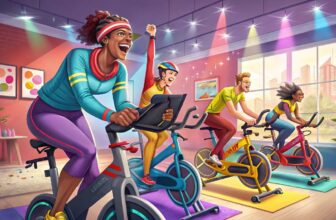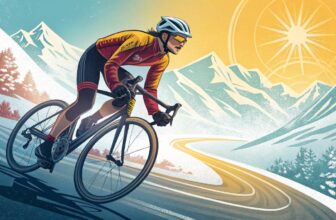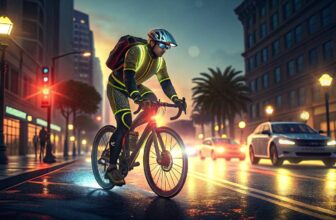Understanding Bike GPS Gizmos
Cycling’s groovy tech twist, these nifty bike GPS gadgets, are must-haves for folks on two wheels. Whether you’re just getting your first set of pedals, hitting those weekend adventures, or clocking in the miles on long tours, a trusty bike GPS doohickey adds a whole new layer of enjoyment to your ride.
Why Navigation Tools Matter
Have tools to guide your bike adventures? Now that’s smart riding. These bike-friendly GPS units offer bicyclists heaps of benefits:
- Finding Your Way: Get those handy turn-by-turn directions right there on your bars, helping you explore new paths without getting lost.
- Stat Tracker: Measure things like how far, how fast, and how long you’ve ridden to see how you’re doing.
- Looking Out for You: Safety gear like real-time location sharing gives you peace of mind when you’re going solo.
- Training Partner: Spoil sport junkies with structured workouts, feedback, and snazzy stats on their performance.
Top-notch bicycle computers not only pack a ton of ride info but also help steer you through new territories. Want to know more? Check out the best bike computers.
Varieties of Bike GPS Gadgets
Bike GPS gizmos? Loads of choices for every wallet and wish list. Knowing the styles can point you to the perfect pal for your riding fun.
Wallet-Friendly GPS Bike Computers
Great for newbies or penny-pinchers, these devices cover the basics. Perfect sidekicks for logging fundamental numbers like distance, time, and speed (Cycling Weekly).
| Feature | Basic GPS |
|---|---|
| Ride Stats | Distance, Time, Speed |
| Hook-Ups | Limited or Zero |
| Maps | Basic |
| Screen | Monochrome |
Step-Up GPS Bike Computers
For those after a bit extra, mid-level units bring colorful displays, better maps, and smartphone hooks (Cycling Weekly).
| Feature | Mid-Tier GPS |
|---|---|
| Ride Stats | Custom Data Choices |
| Hook-Ups | Smartphone, WiFi |
| Maps | Smarter |
| Screen | In Color |
| Extra Perks | Workouts, Social Stuff |
Big-League GPS Bike Computers
Full-blown features for the serious speedsters out there. Extensive maps, spot-on directions, long-lasting juice, and sensor syncs (Cycling Weekly).
| Feature | Premium GPS |
|---|---|
| Ride Stats | Advanced Numbers |
| Hook-Ups | WiFi, Bluetooth, ANT+ |
| Maps | Super Detailed |
| Screen | Color Touchscreen |
| Extra Perks | Spot-On Directions, Live Segments, Smart Alerts |
Plunking down cash for a worthy bike GPS unit can do wonders for your journey on two wheels. To sift through the finest selections, check out the best bike computers and bag the one that ticks your boxes.
Top Bike GPS Devices
Looking to glide effortlessly through bike trails? Snagging a primo bike GPS device can be your best bet. Here’s the scoop on some of the most raved-about devices by cycling enthusiasts.
Garmin Edge 530
Mountain bikers and Sunday riders have one thing in common: the Garmin Edge 530. It’s got a 2.6-inch screen, tipping the scales at just 75.8g. With a battery lasting 20 hours—and potentially 40 if you hit battery-saving mode—this gadget’s your trusty sidekick. Its beefed-up mapping skills and MTB-friendly perks like ClimbPro, Find My Edge and Grit and Flow metrics make it a slam dunk. MBR gives it two thumbs-up for its balance of price and user-friendliness.
| Thingamajig | Specs |
|---|---|
| Screen | 2.6 inches |
| Weight | 75.8g |
| Juice Life | 20-40 hours |
| Special Features | ClimbPro, Find My Edge |
Garmin Fenix 6 Pro Solar Edition
The Garmin Fenix 6 Pro Solar ain’t just a watch—it’s your fitness buddy. Outfitted with heartbeat checks, breathing rates, blood oxygen readouts, and training stats, it’s got your back. Reliable routes and seamless syncing with apps make it a catch for sports lovers and cyclists wanting variety. Although the tag’s hefty, MBR thinks the feature set makes it worth every penny.
| Thingamajig | Specs |
|---|---|
| Juice Source | Solar Charged |
| Special Features | Heart Rate, GPS |
| Navigation | Turn-by-Turn Directions |
Garmin Edge 1040 Solar
The Garmin Edge 1040 Solar’s got a trick up its sleeve with a solar-charging display, juicing up your ride time to a whopping 45 hours. Using GNSS to nail down mapping, it packs a punch with MTB metrics and maps. MBR dubs it a champ for its mix of cool features and sturdy functionality.
| Thingamajig | Specs |
|---|---|
| Display | Solar-Powered Glass |
| Juice Life | Up to 45 hours |
| Special Features | GNSS, MTB Stats |
Hammerhead Karoo 2
Hammerhead Karoo 2 sports a 3.2-inch colorful touchscreen, running a good 12 hours on a single charge. With features galore, it’s easy to use with screen and button options and hooks up to various sensors. Despite lacking some MTB goodies, its vibrant visuals are a saving grace according to MBR.
| Thingamajig | Specs |
|---|---|
| Display | 3.2 inches Color |
| Juice Life | 12 hours |
| Special Features | Touch & Button Control |
Wahoo Elemnt Roam V2
Wahoo Elemnt Roam V2 is hailed for user-friendliness with no-nonsense setup and precision mapping. It delivers with Dual Band GPS, luring you in with promises of 17-hour battery life. Plus, its smartphone buddy routine makes it a trusty navigator, says MBR.
| Thingamajig | Specs |
|---|---|
| Juice Life | 17 hours |
| Navigation | Dual Band GPS |
| Special Features | Smartphone Hookup |
For more handy tips on picking a bike GPS, hop over to our bike computer guide. And while you’re at it, consider complementary gadgets like phone mounts and lights to light up your adventures. Each gizmo is packed with quirks to boost your biking fun and finesse.
Comparing Bike GPS Brands
Deciding on the right bike GPS can feel like choosing the perfect snack—Garmin and Wahoo are at the top of the list, but they’re not the only options. We’re laying out the details on these brands, plus the Bryton Rider 420T and Wahoo Elemnt Bolt V2, diving into what makes each of them tick.
Garmin vs. Wahoo
Garmin is the rockstar in the bike GPS scene, loved by pedaling fanatics for its solid perks and features. Think models like the Garmin Edge 130 Plus and Edge 1030 Plus—they’re the business when it comes to navigating and tracking your rides (BikeRadar).
Then, there’s Wahoo, bringing that easy-to-use flair without burning a hole in your pocket. The Wahoo Elemnt Bolt and Roam shine for their simplicity and map features, making your ride a breeze (Bike Shop Girl).
| Feature | Garmin Edge 130 Plus | Garmin Edge 1030 Plus | Wahoo Elemnt Bolt | Wahoo Elemnt Roam |
|---|---|---|---|---|
| Battery Life | 15 hours | 20 hours | 15 hours | 17 hours |
| Screen Size | 1.8 inches | 3.5 inches | 2.2 inches | 2.7 inches |
| Mapping | Basic | Advanced | Advanced | Advanced |
| Price | $199 | $599 | $249 | $379 |
If you’re Team Garmin, big perks include plugging into a world of sensors and gadgets, perfect for those who geek out over performance stats and sensor hookups like ANT+ (Bicycles Stack Exchange).
For Wahoo enthusiasts, it’s all about the buzz of a hassle-free user experience. Its gadgets shine for folks who love a simple, no-fuss ride (ElectricBikeReview Forum).
Bryton Rider 420T
Got a budget in mind? Enter the Bryton Rider 420T. It’s a sweet mix of wallet-friendly and full-featured, making it a hit with penny-pinching bikers. You get a 2.3-inch screen, sensor-ready functions, and 35 hours of juice. With turn-by-turn navigation and both ANT+ and Bluetooth support, it’s a steal for the price.
| Feature | Bryton Rider 420T |
|---|---|
| Battery Life | 35 hours |
| Screen Size | 2.3 inches |
| Mapping | Turn-by-turn navigation |
| Price | $129 |
Internal links for some more hot picks:
- bike computer guide
- best bike computers
Wahoo Elemnt Bolt V2
Meet the Wahoo Elemnt Bolt V2, a step up from its little brother, with better maps, a shiny color screen, and a slick interface. Real-time tracking and turn-by-turn directions make this gadget a must-have for tech lovers and serious riders alike.
| Feature | Wahoo Elemnt Bolt V2 |
|---|---|
| Battery Life | 15 hours |
| Screen Size | 2.2 inches |
| Mapping | Advanced |
| Price | $299 |
For those hunting for a reliable ride guide, the Bolt V2 is solid. Its friendly design and sensor sync means it fits a lot of biking styles.
For some more gear picks and tips:
From pro features to ease of use, these top players have something for everyone. Whatever you’re after—feature-packed, user-friendly, or cost-effective—there’s a bike GPS that gets what you’re all about.
Features and Functionality
So you’re in the market for a dynamite bike navigation device, huh? Whether you’re pedaling on weekends or teaching it out on a GPS gadget, picking the right one can up your cycling game.
Basic Bike Computers
For the fresh bike owner or the daily commuter, basic GPS cycling computers are a solid pick. They do the trick if you’re after the essentials like tracking distance, time, speed, and lap times (Cycling Weekly). These little gizmos might even throw in some data storage, have auto-pause features, and hook up with heart rate or cadence sensors using ANT+ technology.
| Feature | Description |
|---|---|
| Distance Tracking | Measures how far you’ve traveled |
| Speed Tracking | Keeps tabs on your pace in real-time |
| Time Tracking | Watches the clock during your ride |
| Lap Times | Logs lap times for you speedsters out there |
| ANT+ Connectivity | Links to sensors like heart rate monitors |
Basic bike gadgets stick with the must-haves, but fancy extras like colorful screens and snazzy mapping aren’t in their wheelhouse. Perfect choice for riders who just want to check the basics without any fuss.
Mid-Range GPS Cycling Computers
Moving up the ladder, mid-range GPS cycling computers bring a lot to the table—not just more features but variety too. They’re great for those long rides or zipping through city streets. Think color screens with maps and options to connect to all sorts of your tech stuff.
Some of these tech wonders even wirelessly tap into your smartphone. That means syncing data, catching notifications, and updating firmware, with no USB string attached. They let you tailor what you see, help you follow structured workouts, and even brag about your rides and stats to your friends.
| Feature | Description |
|---|---|
| Color Screens | Brings life to your ride with a splash of color for navigation |
| Mapping Capabilities | Gives turn-by-turn directions and detail-laden maps |
| Wireless Connectivity | Hooks your phone to the device for alerts and updates |
| Custom Data Fields | Lets you tweak the display to see whatever’s most important to you |
| Structured Workouts | Plans your training like a coach in your pocket |
| Social Interaction | Turns your ride into a community affair—share the thrill with pals |
Devices like the Hammerhead Karoo 2 and the Wahoo Elemnt Roam V2 effortlessly marry the ease of use, touchscreen and button features, and lots of map details with sensor-friendly compatibility (MBR). Then there’s the Bryton Rider 420T, which is gentle on the wallet but generous with features like a heart rate monitor and basic directions, making it a bang-for-your-buck choice.
These middle-of-the-road devices make sense for all sorts of bicycle fans, blending useful features with a price that doesn’t sting. Need more wisdom to snag the right gadget? Swing by our bike computer guide.
Understanding what basic and mid-range bike computers can do helps you pick what’s spot on for your rides. Don’t stop there—peep our tips on cycling hydration guide, bike lock types, and bike storage options for more ways to sweeten your cycling scene.
Advantages of Bike-Specific GPS
Battery Life Perks
When it comes to keeping your bike rides uninterrupted, bike GPS devices shine with their impressive battery longevity. Take the Garmin Edge 1040 Solar as an example—it boasts up to 45 hours of juice, dwarfing the puny 6 hours from a typical smartphone running navigation. This means more time pedaling with less stress about your gear quitting mid-ride. Plus, with solar charging magic, you can top up power on sunny trails (MBR).
| Gear | Battery Time (Hours) |
|---|---|
| Garmin Edge 1040 Solar | 45 |
| Wahoo Elemnt Roam V2 | 15 |
| Smartphone on Navigation | 6 |
Built to Last
If you’ve ever dropped your phone, you know the heartache of screen cracks. Dedicated biking GPS gadgets are built to take a hit. In crashes or bumpy rides, these little machines shrug off damage like it’s nothing. There’s a story of a Wahoo GPS that got off easy with just a scratch after a tumble—imagine the carnage with a smartphone (Bicycles Stack Exchange). Their tough-as-nails build lets you focus on the ride instead of a potential tech meltdown.
Sturdy as a mountain goat, these devices are a no-brainer for commuter cyclists, weekend warriors, and long-haul riders.
Sensor Savvy
Smart as a whip, bike GPS devices play well with wireless sensors, thanks to their low-energy ANT+ tech. This smart tech option keeps your batteries going longer, both in your GPS unit and in sensors like speed and cadence meters (Bicycles Stack Exchange).
Having a devoted GPS unit fits seamlessly with your gear, dishing out precise data for every pedal push, which is gold for data-heads and performance pros gunning for those stats.
Cheat Sheet
| Aspect | Dedicated Bike GPS | Smartphone |
|---|---|---|
| Battery Life | Max 45 hours (Garmin Edge 1040 Solar) | Around 6 hours |
| Toughness | Strong (Robust Build) | Weak (Brittle Screen) |
| Sensor Prowess | Excellent (ANT+ Tech) | Meh (More Power Drain) |
So, when you’re gearing up for another epic ride, think about what a dedicated bike GPS brings to the table. Be it longer battery life, tougher build, or slick sensor use, these devices pack a punch for riders of every stripe. If thirsty for more, peep our best bike computers list for a deeper dive into biking gear that flips the script on your cycling adventures.
Battery Efficiency Comparison
Comparing battery efficiency between bike GPS devices and smartphones matters a bunch for long-distance cyclists who rely on navigation tools to get them from A to B without interruptions. How long a battery can last directly affects a rider’s experience on those lengthy treks.
Cycling Computers vs. Smartphones
Dedicated bike GPS units simply outshine smartphones when it comes to how long they can keep you going. Gadgets like the Wahoo boast up to 15 hours of juice, while your typical smartphone clocks out at about 6 hours with GPS draining its battery (Bicycles Stack Exchange). Having that extended time means fewer stops to charge—something you definitely want on a marathon ride.
| Device | Average Battery Life with Navigation (hrs) |
|---|---|
| Wahoo | 15 |
| Smartphone | 6 |
Built tougher too, these GPS computers stand strong against falls and tough conditions. Users say their GPS units might come away with a scratch in a fall, but a smartphone would likely call it quits with far more damage (Bicycles Stack Exchange).
Importance of Lower Power Consumption
Why do bike GPS devices win in the battery life game? It mostly boils down to lower energy needs, especially when pulling data from wireless sensors like those for speed or cadence. These computers use ANT+ tech, which sips power gently, letting the device and the sensors last longer than if they were using more intense energy sources (Bicycles Stack Exchange).
Smartphone screens are power-hungry beasts, even when not in use. Meanwhile, bike computers rock simpler displays that aren’t as draining, boosting their battery endurance.
| Power Consumption Feature | Smartphone | Bike GPS Computer |
|---|---|---|
| Screen | High | Low |
| Sensor Data Collection | Moderate | Low (ANT+) |
If you’re hunting for the perfect navigation tool for your cycling escapades, dedicated bike devices offer far better battery performance and dependability. This is a big deal for those who tackle long distances and want continuous guidance without the battery giving up.
Want to know more about keeping your tech charged on bike trips or finding the right gear? Explore our bike computer guide, peek at our bike phone mount guide, and grab some tips for maximizing battery life. Keeping your navigation device running smoothly is key for a fun and safe ride!
Maximizing Battery Life
Keeping your bike gadget juiced up for long rides is key for smooth adventures. No one wants their navigation to die mid-ride, right? Here are some straightforward ways to stretch that battery life like a pro.
Screen Optimization
The screen’s a sneaky battery hog on any device, including your trusty bike GPS. No worries, though, some simple hacks can keep your battery happy!
- Dim the Lights:
- Dial down the brightness to a comfy level.
- Use auto-brightness to adjust to the sun’s mood swings.
- Blackout When You Can:
- Let the screen snooze when you ain’t using it.
- Set it to wake up only for the big stuff, like turns or alerts.
- Power-Saving Wizardry:
- Switch on battery saver modes that trim down screen time.
- Some gadgets slow down screen refresh to pinch extra juice.
- Cut the Clutter:
- Stick to showing the basics—like speed and turns.
- Skip those power-chomping animations and flashy widgets.
Power Management Techniques
Screen tricks aside, there are more ways to keep your device lively through those epic marathon rides.
- Sensor Supervision:
- Turn off sensors like heart rate monitors if they ain’t needed. Most sensors sip power sparingly, but still, loose connections can sneakily gobble energy.
- Tweak GPS Gadgets:
- Choose GPS settings that balance accuracy with energy use.
- Mix GPS and Glonass satellites for swift signal catch without killing the battery.
- Stay Updated:
- Keep the gadget’s software fresh to enjoy the latest fuel-saving updates.
- Makers frequently dish out tweaks that fine-tune battery use.
- Bring Backup Juice:
- For epic rides, carry a little battery pack buddy.
- Make sure it plays nice with your device for on-the-move charging.
Check out this quick battery life showdown between some cycling computers and smartphones:
| Device | Battery Life (Hours) |
|---|---|
| Wahoo Elemnt Roam V2 | 15 |
| Garmin Edge 530 | 20 |
| Hammerhead Karoo 2 | 12 |
| Average Smartphone (with navigation) | 6 |
Bike GPS gadgets, like Wahoo Elemnt Roam V2 and Garmin Edge 530, totally outlast smartphones (Bicycles Stack Exchange).
Want more savvy cycling tips? Peep our guides on the best bike computers, bike light guide, and cycling hydration guide.
With a few tweaks here and there, you’ll be the battery life boss of your next cycling adventure!




